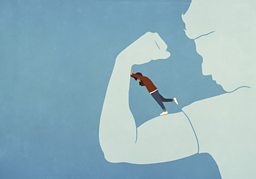What is the Patriarchy?

In Antisocial: Barbie and the Patriarchy, Adam Fleming investigates the themes of the blockbuster movie and what it says about the modern world. Are we still living in a patriarchal society? But before the show gets to that question, it begs another: what do we mean when we talk about the patriarchy?
In a bonus mini episode, Adam asks Professor Lucy Delap, who specialises in the history of feminism at the University of Cambridge, what the term means and where it comes from.
It started as a reason to keep the monarchy
The notion of a patriarchal society was first written about in England 400-500 years ago. “In the 16th and 17th centuries, people who were interested in political structure started talking about patriarchy as a means to capture what many of them thought was a kind of divinely ordained system,” says Professor Delap. “God ruled over Adam, Adam ruled over Eve. Kings ruled over their subjects. Fathers ruled over their household. Husbands rule their wives. They would have understood that there's a sort of natural or God-given structure into which all forms of human relations could be knotted. They called that patriarchy.”

Patriarchy was not a global concept
While the notion of patriarchy was widespread, especially in the western world, not all societies saw men as automatic rulers. “The Seneca Nation, for example, in North America,” says Professor Delap. “[It] was subjected to a very significant study by ethnographer Lewis Henry Morgan…in the 1870s. He was completely fascinated by the matriarchal society… of the Seneca, where male and female roles were not very clearly defined and where women exercise power, and inheritance sometimes went down the female line.”
Men needed to know who their children were, and therefore, they needed to control women's behaviour and to control their sex lives.
It was spread by colonialism
Western colonialists believed the places they invaded should adopt their values, so patriarchal systems were often imposed on other countries. “Missionaries and colonial administrators of all kinds, and army officers, were finding, as they invaded countries across the world that there was a great variety of forms of social organisation,” says Professor Delap. “They tried to bring government structures that prioritised male authority. So where they didn’t find patriarchy on the ground, they tried to set it up.”
The modern notion of patriarchy was defined by Friedrich Engels
Friedrich Engels was a German philosopher who lived in the 1800s and was the closest friend and collaborator of Karl Marx. He helped Marx write The Communist Manifesto, but he’s also often credited as coining the modern meaning of patriarchy. “Engels wrote a book with the ambitious title The Origin Of The Family, Private Property And The State,” says Professor Delap. “That was published in 1884. Engels argued that patriarchy was about men extending their power over women. He believed that men wanted to pass on their property to their children, or specifically to their sons. They needed to know who their children were, and therefore, men needed to control women's behaviour and to control their sex lives. And they wanted to do that in the institution of monogamous marriage. That for Engels is the first point of patriarchal oppression.”

By the 19th century, women in the UK had very few rights
“The legal system, the political system, and social attitudes were absolutely skewed around gender [in the 19th century],” says Professor Delap. “Women in the 19th century couldn't obtain custody of their children; couldn't easily leave an unhappy or violent marriage; couldn't own property in their own right; their husbands had the right to all their earnings if women were working. There was an enormous structural sense that women were second class citizens, or not even regarded as citizens at all. Of course, they couldn't vote until 1928.”
The fight for women’s rights took hold in the early 20th century
By the end of the 18th century, women across Europe were beginning to demand more rights. It was the start of the feminist movement. In the UK, the feminist movement began to get attention at the beginning of the 20th century, most famously due to the Suffragettes, who demanded equal voting rights. “In the 19th century and the early 20th century, women were excluded from so many rights and privileges that feminist campaigning was by and large focused on specific institutional changes like property rights, or enfranchisement or access to schools and universities,” says Professor Delap. A long battle had begun.

The term "Patriarchy" became valuable to second wave feminists
In the 1960s and 70s, the second wave of feminism began. Where first wave feminists had been primarily focused on legal rights, like the right to vote or own property, second wave feminists wanted to eradicate the notion that women should have to ask for those rights. “Women’s liberation was [not about] trying to get women included in existing structures, but critiquing those structures,” says Professor Delap. “So rather than knocking on the door and saying, ‘Can we come in?’, women were saying, ‘Why is society so stacked against women and how could we organise it differently? Why are women experiencing violence across every sector in which they find themselves? Why are religions so opposed to women's spiritual presence? Why do the courts always discriminate against women? Why are adverts so sexist and demeaning and objectifying? The term ‘Patriarchy’ gave a clear name to the system they were trying to demolish and helped make it clear that it was about a system, not a whole gender.
“Patriarchy really gave men the chance to come on board as well and say, ‘This is not a struggle against men. It’s a struggle against social organisation and men themselves may have a stake in that changing.’”

How did the patriarchy stand with second wave feminism?
How women's liberation was about critiquing structures rather than infiltrating them.
The notion of the patriarchy has not gone away
For a time, patriarchal systems were less talked of in general society. Professor Delap says the reason the patriarchy is being talked of in films like Barbie is because there have been clear recent demonstrations of its persistence. “When Trump described grabbing women by the p***y,” she says, “that was one of those moments where in a kind of pithy form, we had an icon of the power of patriarchy to make that possible for Trump.” She points to several movements that she says demonstrate the persistence of patriarchal power. “#MeToo. Everyday Sexism. Everyone’s Invited. These have been viral digital media campaigns that have connected women’s experiences.”
-
![]()
Listen to AntiSocial: What is the Patriarchy?
Where does the term βpatriarchyβ come from and how has it been used through history? Adam speaks to Lucy Delap, professor in modern British and gender history at the University of Cambridge.

Discussion and analysis on Radio 4
-
![]()
AntiSocial
Peace talks for the culture wars. In an era of polarisation, propaganda and pile-ons, Adam Fleming helps you work out what the arguments are really about.
-
![]()
The Briefing Room
David Aaronovitch and a panel of experts and insiders present in-depth explainers on big issues in the news.
-
![]()
Analysis
Examining the ideas and forces which shape public policy in Britain and abroad, presented by distinguished writers, journalists and academics.
-
![]()
A Point of View
A weekly reflection on a topical issue.





